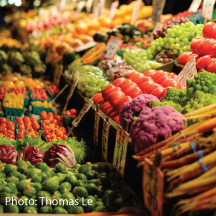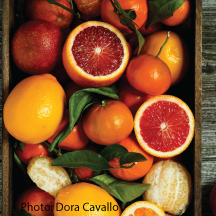|
The Hidden Healthy Power in
Plants 
Coming
to light, finally, are an incredible set of nutrients found in plants that are
becoming more understood as a powerful subset apart from the vitamins and
minerals present in plants, having incredible bioactivity in our bodies enhancing
the wellness we receive from eating plants or supplementing with plant based,
naturally occurring, non synthetic vitamins. You will never find these powerful
ingredients in synthetic vitamins or processed foods fortified with synthetic
vitamins!
The study of phytochemicals has become more
intense over the last decade. Phytochemicals, which include polyphenols, are
present in plants, grains, fruits, bark, roots, stems, flowers, tea, wine
and vegetables. Flavonoids are
natural polyphenols produced by plants that can be further categorized into
anthocyanidins, flavanols, flavanones, flavonols, flavones, and isoflavones
(4,5). The beneficial properties attributed to plant flavonoids include
antioxidant, anti-inflammatory, neuroprotective, anti-carcinogenic and free
radical scavenging.
This is
a highlight of a few of the multitude of phytonutrients. The sources
highlighted are used in Mountain Rescue Nutrients:
Flavonoid: Kaempferoll
(Flavonol)
Source: Tea, moringa, spinach, kale,
dill, chives, tarragon
Benefits:
antioxidant, anti-inflammatory, antimicrobial,
anticancer, cardio protective, neuro protective, antidiabetic, antiosteoporotic, estrogenic/antiestrogenic,
anxiolytic, analgesic, and antiallergic activities, apoptosis programed cell death (1)
Flavonoid: Luteolin (Flavone)
Source: Celery, parsley,
broccoli, onion leaves, carrots, peppers, cabbages, apple skins, and
chrysanthemum flowers
Benefits:
anti-carcinogenic, antioxidant,
and anti-inflammatory (1,2)
Flavonoid: Apigenin (Flavone)
Source: parsley, chamomile, celery, vine-spinach,
artichokes, and oregano
Benefits:
anti-inflammatory, antioxidant
and anticancer properties(6)
Flavonoid: Tangeretin (Flavone)
Source: Peel of citrus fruits, orange
Benefits:
Lowering cholesterol,
anti-tumor activity and neuroprotective action(7)

Flavonoid: Nobiletin (Flavone)
Source: Citrus fruits, orange
Benefits:
neuroprotection, cardiovascular
protection, antimetabolic disorder, anticancer, anti-inflammation, and
antioxidation (8,9)
Flavonoid: Quercetin (Flavonol)
Source: Green tea, grapes, berries, tomatoes, onions, apples
Benefits:
Antiviral, anti-inflammatory, anti-carcinogenic,
antioxidant(10,11)
As you see from this small sample of
phytonutrients they have so many benefits that can’t be overlooked. As research
continues more co-factors of vitamins, naturally occurring in plants will be
discovered. With knowledge of their existence, understanding the power they
have to improve your health, the importance of eating organic fruits and
vegetables whenever possible should be clear. When you can’t eat properly, using
responsibly sourced, organic plant-based vitamins as a supplement must be a
priority.
Lets be clear here, 98% of vitamins
on store shelves are synthetic, made in a lab, mostly from china, and will not
contain any phytonutrients let alone the vitamins and minerals found in nature.
Processed foods are stripped of the
natural nutrients including vitamins, minerals and phytonutrients making them
hollow of any goodness. Food companies “fortify” the processed foods with
synthetic vitamins trying to replace what they ravaged during processing. Don’t
be fooled, the synthetic vitamins in no way replace natural ones that are
contained in unprocessed fruits and vegetables.
When shopping grab for the colorful
fruits and vegetables and some of your favorite herbs and legumes. Red wine
even has phytonutrients so don’t be afraid of a nice glass with your meal.
Don’t destroy your health, immune
system and your overall well being eating processed, nutrient negative foods! Feed
your amazing bodies with the utmost care, you will feel a difference!
In the 30s & 40s Dr Royal Lee (father
of holistic nutrition) understood the importance of these co-factors and the
multiple molecules involved in the function of the whole vitamin. Dr. Lee
believed the simple fact: “vitamins are not single chemicals, but
rather they are complex groups of interdependent compounds that can be made
only by living organisms. A true vitamin, Dr. Lee insisted, is a biological mechanism that can be
obtained only from whole, unprocessed foods. This principle—that vitamins
are the result of life and their functions are far too complex to be reproduced
by human beings” (12)
“In nature a vitamin isn’t a single molecule but rather a
part of a family of molecules” (12)
I’ll explore further
the life of Dr Royal Lee in a future article.
At Mountain Rescue
Nutrients we use only the finest nutrient packed organic plants and concentrate
their goodness only using water.
Cheers,
Steve (Oly) Olson
Founder/Managing
Partner
Mountain Rescue
Nutrients
MrNutrients.com
Certified Nutrition
Coach
Autoimmune Researcher
Sources:
(1) https://www.sciencedirect.com/topics/medicine-and-dentistry/kaempferol
(2) Molnár et al., 1981; Selvi et al., 2015; Xia et al., 2016
(3) https://www.sciencedirect.com/topics/pharmacology-toxicology-and-pharmaceutical-science/luteolin
(4) Polyphenols: food sources and
bioavailability.Manach C, Scalbert A,
Morand C, Rémésy C, Jiménez LAm J Clin Nutr. 2004 May; 79(5):727-47.
(5) Nutritionally improved agricultural
crops.Newell-McGloughlin M Plant Physiol. 2008 Jul; 147(3):939-53.
(6) https://www.ncbi.nlm.nih.gov/pmc/articles/PMC2874462/
(7) https://aphios.com/products/research-chemicals-apis/tangeretin/#:~:text=Source%3A,Rouseff%20and%20Ting%2C%201979)
(8) https://www.ncbi.nlm.nih.gov/pmc/articles/PMC5059563/
(9)
Citrus nobiletin suppresses
inducible nitric oxide synthase gene expression in interleukin-1β-treated
hepatocytes.Yoshigai E, Machida T, Okuyama T, Mori M,
Murase H, Yamanishi R, Okumura T, Ikeya Y, Nishino H, Nishizawa MBiochem
Biophys Res Commun. 2013 Sep 13; 439(1):54-9
(10)
https://pubs.acs.org/doi/10.1021/acsomega.0c01818
(11)
https://www.ncbi.nlm.nih.gov/pmc/articles/PMC4808895/
(12)
https://www.drroyallee.com/biography/
|



